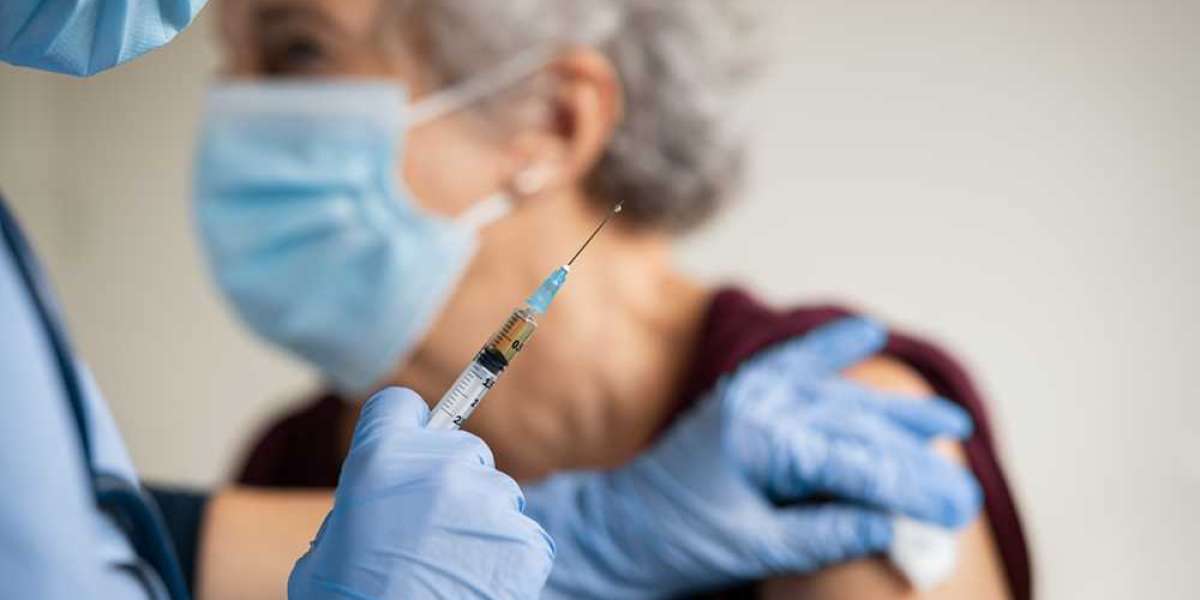If you are an older adult, or if you care about someone who is, you should know that we are at a critical juncture in the pandemic. After years of waiting, the first COVID-19 vaccines have arrived, and older persons should be given first attention in order to lower their chances of becoming very sick or dying if they contract the coronavirus.
Nonetheless, this ray of light arrives at precisely the same time when new, mutated strains of the virus threaten to accelerate the spread of the virus, adding to the already high numbers of COVID-19 cases, hospitalizations, and fatalities.
With age comes the increased danger of being extremely ill or dying if one contracts the coronavirus – and having health issues such as diabetes or being overweight increases that risk even further. In addition,
As the pandemic enters its second year, older persons may experience a range of emotions, including hope, anxiety, exhaustion, anger, fear, and determination.
Elder adults have been disproportionately affected by this pandemic, and not just in terms of their physical health, says Preeti Malani, M.D., an infectious disease and geriatrics specialist at Michigan Medicine, the academic medical center of the University of Michigan and the director of the National Poll on Healthy Aging. "Older adults have been disproportionately affected by this pandemic, and not just in terms of their physical health," says Malani. This winter, it is critical to find safe ways to interact with others, get outside and move about while also taking care of your medical needs," says the National Weather Service.
Listed below are some important tips to keep in mind this winter if you are an older adult, or if you live with or love someone who is (these suggestions also apply to younger people who have health conditions that make them more vulnerable to the worst effects of COVID-19, such as people who have autoimmune conditions or immune systems that have been compromised by a condition they have or treatments they are receiving):
1. As soon as possible, get the flu vaccine.
If you are exposed to COVID-19, it is completely safe and will help prevent you from acquiring a severe case of the virus. You should check your state, county, or local health department's website for updates on how and when to make your visit, as well as any updates from the health system, doctor's office, or pharmacy where you receive your treatment and drugs.
Some states have begun vaccination with adults above the age of 75, as well as critical workers of any age, while others have expanded vaccination to include anybody over the age of sixty-five. People with specific medical issues will be the next to be targeted.
The majority of the time, you'll need to schedule an appointment rather than simply showing up to get a shot. Don't be hesitant to seek for assistance if you're having trouble with a website or mobile app that you're unfamiliar with.
If your doctor's office or hospital has a "patient portal" system, create an account on it right away so that you can receive notifications through it as necessary. Michigan Medicine patients will be able to select their own appointment times using the portal, which is now being implemented. According to a recent poll conducted by Malani, fewer than half of persons over the age of 50 have created a patient portal account, and the ratio is much lower among people of color, Hispanics, and those with lower incomes and educational levels.
Don't allow a little bit of technology stand in the way of you getting the vaccine that can save your life!
Also, make certain that you're making the appointment from an official source – don't be tricked by scam websites that have deceived some elderly people in the past.
In October, Malani and her polling team partners discovered that many older persons desired additional information about the COVID-19 vaccine from trustworthy sources, such as their own doctors, and that they were willing to pay for it. However, make certain that the sources you're consulting are reputable — hospitals, government health agencies, and major, well-known nonprofit groups that are focused on aging or health are the ideal places to start your search.
2. Once you've had your vaccination, refrain from acting as though you have superpowers.
For starters, it can take up to two weeks after the initial injection for your immune system to become familiar with the coronavirus. Furthermore, it requires two doses of the vaccine, spaced several weeks apart, to provide complete protection. In those initial few weeks, if you were exposed to a coronavirus before or after becoming vaccinated, you can still become extremely ill with COVID-19. (However, the vaccination cannot give you COVID-19 because it does not contain the entire virus.)
Even after receiving your second dosage, you can still become infected, though you will most likely not become as sick as you would have otherwise. It is possible that you will still be able to infect others, though researchers are investigating whether or not this is the case. As a result, the next step is critical as well.
Wearing masks, avoiding social gatherings, and making non-essential journeys are all recommended, as is depending on takeout, curbside, and delivery services whether you have received the vaccine or not.
Because the virus is still widespread over most of the United States, even as more people are immunized and their vaccine begins to take effect, it might take months before the spread of the virus is slowed. Still, it's critical that we continue to follow through on all of the precautions we've taken (or should have taken) since spring in order to limit our chances of contracting or transmitting the virus.
The most important thing to remember is to never spend any time indoors with other people (apart from those you live with) without wearing a mask that covers your nose and mouth the entire time. In order to restrict the spread of coronavirus, masks must be worn at all times, and new regulations governing their use have just been implemented.
Also, avoid holding or attending meetings or activities with big groups of people, even if you are wearing a mask to conceal your identity. Even if your state or county does not impose a limit on the number of individuals who can attend a meeting, the same concept applies: the greater the number of people present, the greater the likelihood that one of them has the virus and is contagious, even if they have not yet manifested symptoms.
Consult the Centers for Disease Control and Prevention website for the most up-to-date information.
When you're feeling better, get outside and make a plan to meet a friend outside with masks on and to keep separate if you're feeling sick.
If you dress adequately (including wearing footwear with good traction), you should be able to walk, hike, visit a park, talk, or engage in other activities despite the chilly weather in many parts of the country.
If the sun is shining, make an extra effort to get outside, either by yourself or with others, because sunlight can improve your mood and vitamin D levels, which is especially important in the winter.
If you walk outside to meet someone who does not live with you, put your masks on and maintain a physical distance from that person. Do not leave your house if there is a chance that you may have been exposed to COVID-19 in the last two weeks, or if you are experiencing symptoms of any sickness.
Pay attention to the recommendations made by your state or county health experts, which are based on the amount of coronavirus activity in your area. When dining or drinking outside or in 'igloo' type structures, where masks are not permitted, it is advisable to stick with members of your own home or with one other household with whom you have agreed to form a "pod" of sorts.
Avoid postponing routine medical and dental appointments or putting off emergency medical treatment.
The ability to protect themselves and you from transmitting or receiving coronavirus has been developed by health professionals – even during sessions where you must remove a mask, such as while getting your teeth cleaned.
Rather than being dangerous, health-care facilities are probably some of the safest locations you can go, aside from your own home. Furthermore, you should not let your fear of the coronavirus prevent you from seeking emergency care, despite the fact that a recent poll of older persons indicates that this is happening more frequently.
Many medical professionals have also discovered ways to deliver an extensive range of services via video chat or even phone, allowing you to avoid leaving your home entirely. If you haven't already, ask a friend, relative, or someone from your doctor's office for assistance in setting up your ability to see your physicians for "telemedicine" visits.
Make sure you don't allow your health suffer or your preventive treatment be put off any longer because you are concerned about the virus. Hospitals and clinics may advise you to postpone non-emergency care if COVID-19 activity is particularly high in your area, although this is not always the case.
6. Get up and move every day.
Walking around, climbing stairs, stretching, or watching an exercise class online or on television can help you keep your mood up and your muscles active even if you are unable to go outside or do not want to risk a cold, snowy, or wet day.
If you find yourself sitting on the couch or in front of the computer for hours on end, remember to get up at least once an hour to move around, get a drink of water, look out the window, or even participate in a "standing meeting" with coworkers, friends, or relatives, in which you stand or walk around while talking or participating in a video chat.
7. Take special precautions if you have to travel to your place of employment or if a member of your household must travel to school or job.
No matter how old they are, people who are considered "important workers" should seek advice from their employers about being vaccinated soon, should they not already have done so. If you are one of them, or if you live with someone who is, it may be more expedient to get vaccinated using this method.
However, even once someone begins the immunization procedure, there is still a chance that they will become unwell (see above.) Following notification that someone at your workplace or school has been exposed or has become ill, follow the recommendations of The Centers for Disease Control and Prevention, which include staying at home (quarantining) or staying in a room away from other people until the situation has been resolved (isolating).
8. Be ready for anything.
In light of the virus's continued spread and increased vaccine coverage, it is critical to understand what to do if a member of your household becomes ill with COVID-19. Consult our helpful guide for more information.
9. Make a connection.
You should make a special effort to connect with others virtually during the winter months, even if you don't feel comfortable getting together with people outside or going into stores for essential purchases. This is especially important if you live alone or are at home for a significant portion of the day. During the pandemic, loneliness and social isolation among older persons had increased by a factor of two.
Make contact with an older person you know who may be in need of additional socialization at this time if you know of someone who does. All of the following can be helpful: phone conversations, SMS, video chats, virtual classes and book clubs, television or movie "watch parties," as well as social media.
You can also connect with the Osher Lifelong Learning Institute in your area if one is located near you. For persons over the age of 50, these university-affiliated programs provide a wide choice of lectures, online learning groups, and other valuable programs, among other things. During the epidemic, the majority of these programs will be available online. Online programs and training on how to use online technology may also be available through your local library, museum, arts organization, or senior center, among other places.
10. Be of service to others.
Those who have been affected by the pandemic and its economic consequences have been hurt considerably harder than those who have not.
You should take advantage of this opportunity if you can contribute time, money, or expertise to a cause or organization in which you believe in, or if you can assist neighbors with simple jobs such as snow shoveling, pet walking or outside chores. It's possible that helping others will benefit you as well.


